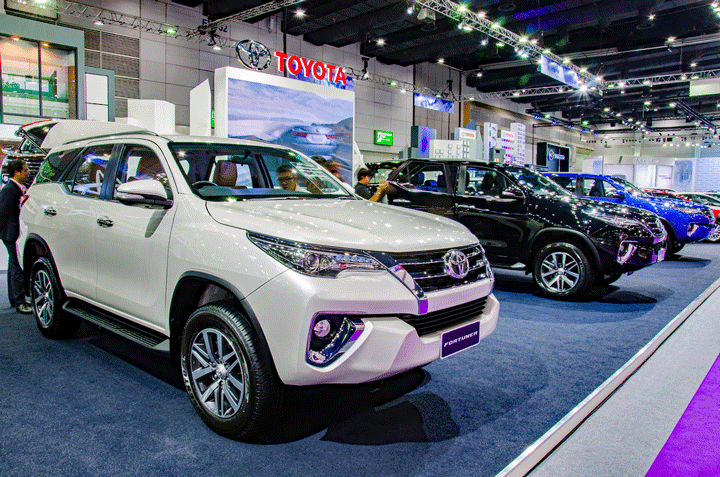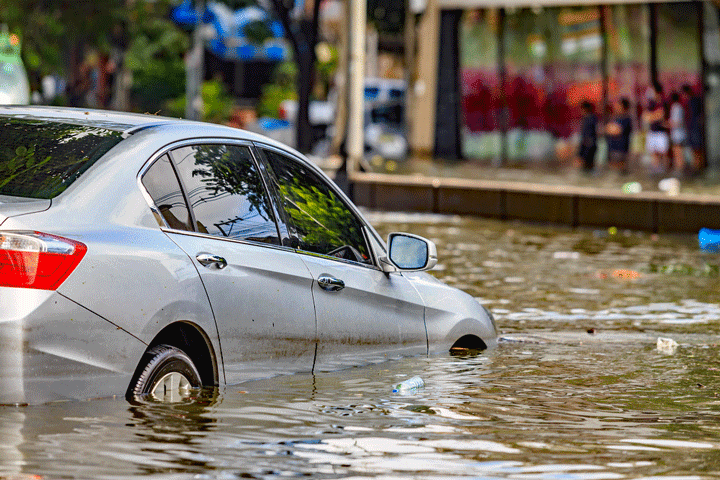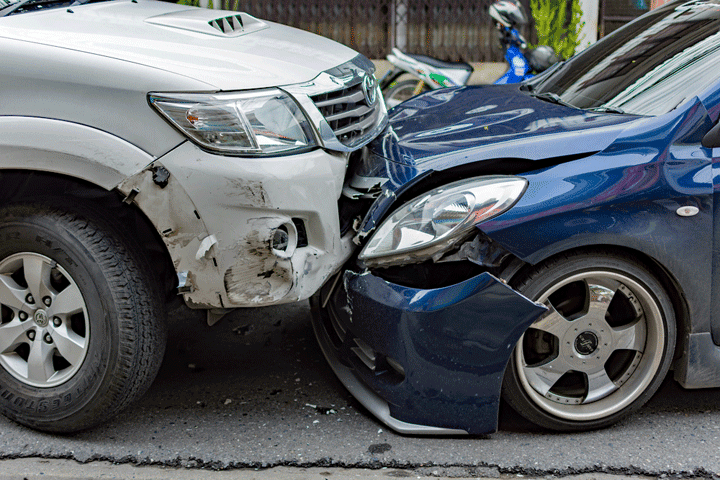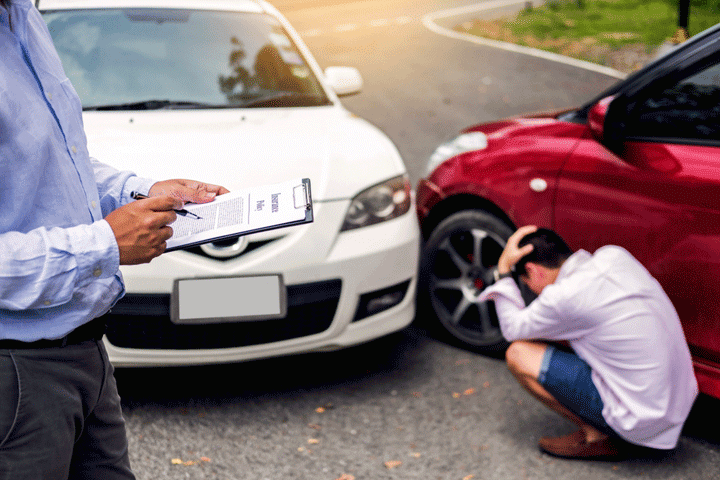(Chatchai Somwat / Shutterstock.com)
There are quite a few differences between car insurance in Thailand and what we are used to in the Netherlands and Belgium. Below is an explanation of the rules and how it works in practice.
1. What types of car insurance can be purchased in Thailand?
- Compulsory (CTPL): insurance required by the government for every motor vehicle. This only covers bodily injury or death (low coverages). Property damage is not covered. You always need the Compulsory, in addition to one of the following insurance policies.
- First Class insurance: this is better known as the All Risks or fully hull insurance. A First Class insurance offers comprehensive coverage for your own car including property damage, bodily injury or death, accident coverage, cover for medical expenses for the driver and passengers, fire, theft and bail.
- Third Class Insurance: this can be compared to the Dutch liability insurance. This covers property damage and third party medical expenses. In addition, there is also cover for medical expenses for its own occupants plus bail bond.
- 3 + 1: covers the same as 3rd class, but damage to your own car is also covered. This insurance does not cover if you have a single-vehicle accident or if the identity of the other motor vehicle is not known.
- 2 + 1: this insurance covers the same as the 3+1 insurance, but fire and/or theft of your own car is also covered.
From Europe we are often used to no longer insuring a car All Risks when it gets a bit older, especially if you have almost never had any damage yourself. However, it is advisable to keep First Class insurance in Thailand for as long as possible. In Belgium and the Netherlands it can be assumed that other road users are all insured. That is a big difference with Thailand where many drivers are not insured. If you incur damage for which a third party is at fault, you can easily end up in a situation in Thailand where you pay for the costs yourself if the other party is not insured and has no money. With a First Class insurance, your company always pays for your damage and then recovers this from the other party. So you don't have to worry about that. You can now insure First Class until the car is 20 years old.
2. Why is the insured value of my car lower than the current value?
On every First Class policy you will find the insurance value of the car in the middle column. This is the amount you receive in the event of total loss or theft of your car.
You will see that this insured amount is lower than the actual value of your car. In Thailand, the car is covered for a maximum of 80 to 85% of the current value. The main reason for this is that the stated amount is paid on both the 1st day of the policy and on day 364. In the latter case, the car is almost a year older and therefore worth less.
3. Will I get a replacement car if my car is being repaired?
Normally you will not get a replacement car. However, since about 2 years ago you can claim “Loss of Use” from the insurance company of the other party (assuming that the other party was at fault for the collision and is insured). For a sedan, the compensation amount is 500 baht per day that you have not been able to use the car.
Loss of Use must be claimed directly by yourself from the other party's company. If the counterparty is not insured, you can still claim Loss of Use from him/her. However, if he is unable or unwilling to pay, the only course of action is through court.
4. What is the difference between dealer and contract garage?
There are 2 types of policies available in Thailand:
- A policy based on dealer garage.
This allows you to take your car to the official dealer for repairs. Insurance with a dealer garage can generally be taken out until the car is 5 years old. This policy is more expensive than a policy with contract garage, but it is still recommended. Dealer garages usually deliver better quality, use original parts and are faster with repairs than contract garages. - A policy based on contract garage.
With these types of policies it is not allowed to take the car to the official dealer (unless you pay the additional costs yourself). Each company has a wide network of contract garages all over Thailand.
5. What are your legal insurance obligations?
The only insurance required by law is the CTPL (Compulsory Third Party Liability). The annual premium for a sedan is 645.21 baht. Although cheap, this insurance only covers physical injury/death at relatively low amounts. Damage to property – whether your own car or someone else's – is not covered.
All other insurance options such as First, Second, Third Class, 2 + 1 etc. are voluntary.
Although you will not be fined, it is of course not advisable to drive around with only the CTPL.
6. Do I accrue No-Claim Bonus (NCB) in Thailand?
Normally, the NCB structure is as follows:
After 1 year: 20%
After 2 year: 30%
After 3 year: 40%
After 4 year: 50%
Note 1: The NCB is only calculated on the base premium. The total premium is made up of various components and NCB is not settled on each component.
Note 2: Contrary to what we are used to, the NCB here belongs to the vehicle and not to the driver. When you buy a new car, you will start again with 0% NCB (transfer from NCB to another car is only possible under special circumstances).
7. How can I lower my premium?
- Switching from dealer garage to contract garage.
- By taking a risk. A deductible of, for example, 5,000 baht for your own damage, only needs to be paid if you are at fault for the collision.
- By taking out a policy based on “Named Drivers”. A maximum of 2 names can be included on the policy. This lowers the premium. If you subsequently lend the car once and damage is caused by the borrower (who is not on the policy), the car is still insured but a deductible of 6,000 baht applies.
- By installing a Dashcam you can in many cases also get a 5 to 10% discount.
8. How come I have to pay 1,000 baht myself?
It may happen that you have a First Class insurance with no deductible but you are still asked to pay 1,000 baht. This can happen if you have suffered damage caused by another motor vehicle whose identity is unknown. In that case, the legal rule in Thailand is that you have to pay 1,000 baht yourself. It is therefore worth considering, if you return to your parked car and see that someone has driven into it without leaving a note, to report to the company that you yourself have hit a bollard.
(PongMoji / Shutterstock.com)
9. Have counterparty cover changed?
Until mid-2020, high cover amounts were often found for the death of the counterparty. However, these high amounts were never paid in practice. The amount to be paid in the event of death was always determined during negotiations between the company and the next of kin. This changed in the middle of last year and the OIC (the Thai insurance regulator) requires companies to pay the amount stated on the policy in such situations. As a result, almost all companies reduced the sums insured. Now 500,000 baht per person has kind of become the standard. Increasing the cover amount is often possible at a small additional cost. That is recommended: 500,000 baht is actually a bit too low.
10. How are the occupants of my own car insured?
On every policy you will see the cover for bodily injury/death of third parties, but also cover for medical costs for the driver and passengers of the own car. The coverages for the latter group are generally low (for example, a maximum of 100,000 baht per person where the coverage for the medical costs of third parties is often a minimum of 500,000 baht). If you bring passengers who are not your own family, they will be covered by the higher third party cover. You as a director and close family fall under the lower cover.
11. Why is Bailbond covered?
In Thailand, if someone dies in a car accident or is injured in such a way that he/she cannot work for 20 days or more, it automatically becomes a criminal act. In that case, the police must officially bring it to court. Theoretically speaking, the police can also detain you at that time if they fear a flight risk. If this happens, someone from the company will come and pay the bail. This is a very theoretical cover as it hardly ever occurs in practice.
12. What should I pay attention to when renting a car?
Rental cars must have special rental insurance. Many smaller landlords in particular do not take this very seriously. Therefore, always ask for the insurance policy. Pay close attention to what is written at the bottom of the policy. If you see a text like the image below, you can assume that this is not a rental insurance.
A consequence may be that the company will not cover if damage is caused.
If you see terms like “For Hire/Rent” or “commercial use” here, it is generally OK.
13. Is someone from the company coming to a collision?
In the event of an accident, it is best to immediately call the emergency number of the insurance company. The company then sends a “surveyor” to the scene of the collision. The surveyor will arrange the paperwork, arrange for the car to be towed if necessary and take care of the contacts with the police.
It is important to know that almost all companies outsource this work to “Law Offices”. If a collision is reported to the company's emergency center, they will see which Law Office is best to call and they will then send someone to the scene.
Despite the fact that Thailand is better organized in this respect than in the Netherlands, the intervention of the surveyor often leads to complaints. The most common complaints about this:
- The Surveyor does not speak English.
Indeed, that often happens. If something needs to be coordinated, the emergency center often acts as a telephone interpreter. - It takes a long time for the Surveyor to arrive on site.
This also happens regularly, especially when the weather gets worse and there are more collisions at the same time. If all surveyors of a Law Office are already occupied, waiting times can be up to an hour.
14. Can I tow a trailer by car without any problem?
Every society deals with this differently. If you want to fit a towbar and tow a trailer by car, first ask your intermediary whether this is permitted. There are a number of companies that no longer cover anything if a trailer is towed.
15. Can I buy the compulsory if I pay the road tax?
There are dozens of companies that offer compulsories. These are also offered at the transportation offices. Many people, including those who already have additional insurance, choose to purchase compulsory insurance when they pay the road tax. Not a problem in itself because cover and premium are the same everywhere. However, it is wiser to take the compulsory insurance with the same company where you have the extra (for example First Class) insurance.
The reason for this is that the extra insurance only starts to cover after the compulsory limit has been reached. Suppose someone is hospitalized due to a collision and the bill is 400,000 baht. The first 80,000 baht will be paid by the society of the compulsory. Only when that limit has been reached will the extra insurance kick in that will continue to cover up to the limit. Needless to say, it can get complicated in such situations if you have to deal with 2 different carriers. So take the compulsory with the same company where you have the extra insurance.
16. What is the cancellation period for car insurance?
No. In Thailand, the rule applies: Non-payment is non-renewal. If you do not want to renew, you do not have to do anything. If you want to cancel early, that is also possible. The company will then reimburse you according to the repayment schedule in the general terms and conditions. This is not pro rata but approximately 75% of the remaining term.
17. Is damage caused by vermin covered?
If you have First Class insurance and, for example, rats chew through the cables, then that is simply covered. If you have a deductible, that will apply.
18. How long do repairs take in Thailand?
Unfortunately longer than we are used to from Europe. This is mainly due to – let me be careful – a different way of planning. In addition, it is simply a lot busier in certain periods (think of the rainy season).
Parts delivery may also take longer. If your car is still drivable, agree with the garage that the car will not be brought in until all parts are there and they have time to start repairing immediately.
19. When is your car a total loss?
If the repair costs exceed 70% of the insured value as stated on your policy, the car will be declared a total loss. You will then receive the amount as stated on the policy. The wreck then becomes the property of the company.
20. Can I co-insure accessories?
It is more or less standard that accessories for 20,000 baht are included in a First Class insurance policy. If you have really expensive accessories, they will have to be specified separately for them to be covered.
If you don't want the hassle of sorting out and comparing prices, please contact us at www.ainsure.net/nl-index.html. The premiums are always the same, whether you go directly to the company or through us. With 6 Dutch people working within AA, we are happy to take this work off your hands.






Thanks Mathieu,
Finally clarity.
Clear article. Thank you.
If I drive my family's car, am I also insured if something happens? They are insured first class .
#redback: Yes, as a rule, every driver is covered (provided you have a valid driver's license, of course). In the rare case of a “Named Drivers” policy, coverage will still apply but there will be a 6,000 baht deductible if the driver is at fault for a collision.
Supplement to this clear article:
With a good first class insurance you also have a kind of roadside assistance. In any case, a telephone number in case of a breakdown.
Motorcycles and cars that have to be inspected due to their age can also be inspected at certified inspection stations in many places
Usually, also at mine, if you go in the morning, you can pick up your new sticker and signed green / blue book in the afternoon, possibly with compulsory insurance. In my case extra charge 100 Baht.
AA insure. That is at least a piece that is useful to us as foreigners in Thailand, simply expressed perfectly and legibly. Thank you for this.
Hello
I drive a 6 year old chevrolet
am insured with Axa first class insurance
I have now been informed that they can no longer assure me of that at the factory
Chevrolet is leaving Thailand because it takes too long for spare parts to arrive
can someone help me further
thanks in advance billy
@billy: This is a known issue. Since Chevrolet announced its withdrawal from Thailand, most companies refuse to provide First Class insurance for Chevrolet. The reason is that they are afraid of parts supply problems. However, there are still a small number of companies where Chevrolet can still be insured First Class. You can send a message to [email protected]
Very good article. Thanks for this info!
Thanks for the useful information Mathieu, especially that of that trailer, good that I was already aware,
Thanks for the clear explanation.
We also insure ourselves through AA Insurance.
Good service and you can be helped further in Dutch!
Recommended!
No, I don't get paid for the advertising I do here for them! 🙂
Just a satisfied customer!
Quote: “With a First Class insurance, your company always pays for your damage and then recovers this from the other party.”
Should I conclude from this that with a Third Class, 3+1 and 2+1 insurance policy, the company first tries to recover the damage from the counterparty and only pays out the amount that the counterparty is willing/able to pay? And how far will the company go to get full compensation for the damage?
@TheoB: With a 2 + 1 and a 3 + 1, damage to one's own car is covered, provided that this occurred during a collision with another motor vehicle and the identity of the other party is known. If you are involved in a collision where the other party is at fault, your own company will pay for your damage in a 1st class, 2+1 and 3+1 and will claim this back from the person who caused the accident.
Damage to your own car is not covered with a 3rd Class insurance (WA). If you have a 3rd class and are involved in a collision where someone else is at fault, your own company will do NOTHING to get your damage reimbursed. Your company does not cover your damage and therefore has no interest in recovering the damage from the other party.
One more question, Matthew.
The text refers to First Class and Third Class insurance. From this I conclude that there is also a Second Class insurance. What does a Second Class insurance include?
@TheoB: A 2nd Class is a 3rd class that also provides cover for fire and theft of your own car. I have not mentioned these separately as this is a more or less dying insurance class. Fewer and fewer companies offer this.
Matthieu, do you perhaps know whether there is such a thing as the Guarantee Fund in Thailand? In the article you talk about (collision caused by) uninsured drivers. If you should experience something like this in the Netherlands, you can always appeal to the Guarantee Fund.
@Theo: Unfortunately, there is no guarantee fund in Thailand as we know it in the Netherlands.
I would like to make a copy/print of the above information, but how do I do that???
Damn well written and presented, would like to receive a copy/print now; but I can't. What should I do? which button/button to press???? Help requested.
You can select the text and then use control C and then paste control V into a word document
" cut and paste "
suc6